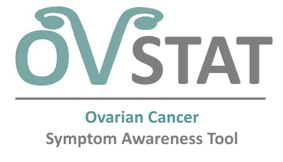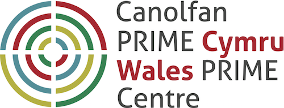 Study title
Study title
OvSTAT (ovarian cancer symptom awareness tool) stakeholder engagement
Principal / Lead Investigator
- Dr Stephanie Smits (PRIME, Cardiff University)
Co-Investigators
- Dr Kate Brain (PRIME, Cardiff University),
- Prof Jacky Boivin (Cardiff University)
Type of study
Stakeholder engagement
Who is the study sponsor?
Cardiff University
Summary
OvSTAT (ovarian cancer symptom awareness tool) is designed to help members of the public identify possible symptoms of ovarian cancer (awareness aspect) and when to seek medical advice about these symptoms (help-seeking aspect). The tool has potential to be provided to members of the public by GPs or Genetic Counsellors, or accessed online. An engagement event will be held to explore the involvement that stakeholders want with OvSTAT, and enable exploration of how best to disseminate OvSTAT to those who need it.
In the absence of evidence-based tools to motivate presentation for early diagnosis in ovarian cancer, we wish to accelerate implementation of OvSTAT amongst people who would benefit from using it. OvSTAT is a paper-based tool designed to support ovarian cancer symptom awareness and help-seeking behaviour. The tool contains information that is relevant to women from the general population, with tailored content for women at increased genetic risk of ovarian cancer. The tool was developed during PhD studies completed by the PI, Dr Stephanie Smits, in 2014. OvSTAT has been designed with a strong theoretical background and follows the MRC complex intervention guidelines.
Public / patient involvement
Attendees: Stakeholders will be identified through co-applicant contacts. Stakeholders will be invited from a variety of disciplines (Primary and Secondary Care, Third Sector, Familial cancer professionals, Policy, Academic, Industry ) in order to explore dissemination requirements and pathways in different settings. Potential users were engaged in the tool development, but further engagement is needed regarded dissemination. Potential tool users (women from general public and women at increased risk) will therefore also be invited and will enable identification of preferences for OvSTAT delivery, e.g. paper-based or web based. These preferences can then be considered and addressed to maximise the implementation and impact of the tool. It is envisaged that stakeholders will suggest ways to do things and users will accept/reject/comment on these approaches.
Aim of the meeting: Potential partners will attend the day in order to highlight what the implementation needs and strategies are of different potential partners. OvSTAT will be presented followed by discussions about fit and implementation needs over coffee/lunch. Interest in OvSTAT and specific implementation needs will be gathered via feedback forms to enable formal collection of ideas to complement identified ideas stemming from discussion. For users, the focus will be on accelerating implementation of OvSTAT amongst people who would benefit from using it. Users would be shown OvSTAT with feedback on content as well as ways to implement it gathered via feedback forms.
How could this research potentially benefit patients?
The ideas generated on the day concerning implementation and use will be used to help develop an OvSTAT implementation and impact plan. At the close of the event the project team will have an understanding of potential implementation avenues available for OvSTAT, and will also have fresh insight in to how the tool is received by providers and users. Feedback forms will act as an information source for guiding implementation and impact ideas.
Funder
Cancer Research UK
Total grant value
£3,998
Start date
Event was held of 29/02/2016
Outputs generated (Reports / Publications)
Smits S, Boivin J, Menon U, Brain K. The double edged sword of ovarian cancer information for women at increased risk. Ecancermedicalscience. 2016; 10: 650. doi: 10.3332/ecancer.2016.650
Impact
OvSTAT (ovarian cancer symptom awareness tool) is designed to help members of the public identify possible symptoms of ovarian cancer (awareness aspect) and when to seek medical advice about these symptoms (help-seeking aspect). An engagement event was held on 29th February 2016 to explore the involvement that stakeholders want with OvSTAT, and exploration of how best to disseminate OvSTAT to those who need it.
The event was attended by 24 people from across England and Wales from a wide variety of areas relating to ovarian cancer, including primary care, secondary care, familial cancer specialties, third sector and academia. The group had a shared interest in early diagnosis of ovarian cancer.
Following the event, flipcharts from group tasks and feedback forms were typed to provide a guide for future ideas for OvSTAT. Clear suggestions were made in relation to improvements to be made to the tool, where to use it and for future research studies that could lead to the tool being tested for its potential impact on the early diagnosis pathway. Notes from the day were also summarised in order to provide attendees with a summary of the day. This process has helped keep the group of 24 attendees up to date with the project, and presents opportunities to collaborate and formalise research ideas that arose on the day.
As a result of the engagement day, a network of people interested in improving early diagnosis in ovarian cancer was established. Following the engagement day, the researchers were invited to a meeting with the Health Minister for Wales to discuss the ovarian cancer agenda in Wales. This invitation and subsequent exposure to the Health Minister would not have happened had it not been for the CRUK development funding.
The funding received to host this event has been a crucial first step in ensuring that OvSTAT is a tool that can be implemented to help promote ovarian cancer awareness. The suggestions and considerations from the day are now being considered by the team, with it envisaged that future grant applications will be generated based on the ideas that were put forward on the engagement day.

